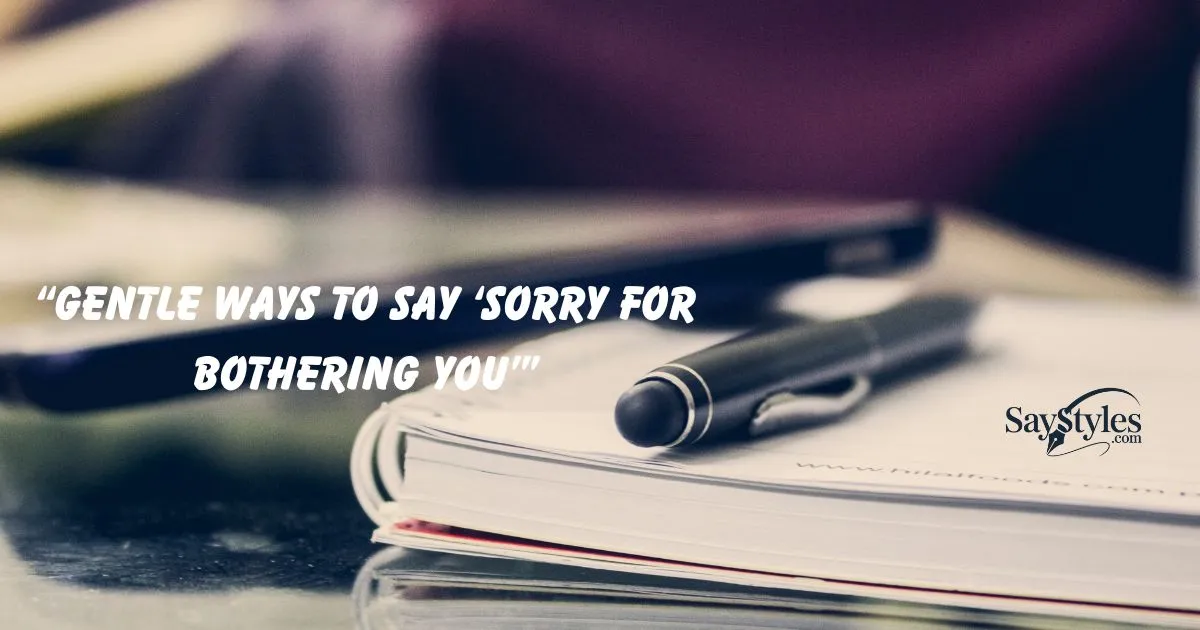“A gentle word can open a heavy door especially when saying sorry for bothering you.”
We’ve all had those moments when we reach out and instantly feel like we’re interrupting someone. I’ve been there too—sending a message, then quickly wondering if I came off as annoying or pushy. But sometimes, all it takes is a kind, thoughtful phrase to ease the tension and keep things warm and respectful.
In this article, I’ll share gentle ways to say “sorry for bothering you” that feel polite, natural, and caring. Whether you’re texting a coworker, emailing a teacher, or just checking in with a friend, these soft and simple phrases will help you sound thoughtful without sounding too apologetic or awkward.
“What ‘Sorry for Bothering You’ Really Means
“Sorry for bothering you” is more than an apology—it’s a polite way to acknowledge an interruption. In casual conversations, it can also set up humor or witty exchanges, making it a perfect phrase for funny responses. It shows consideration, yet opens the door for playful, relatable interactions that make everyday chats more engaging.
List of Ways to Say ‘Sorry for Bothering You’
- I apologize for interrupting you
- Sorry for taking up your time
- I didn’t mean to disturb you
- My apologies for the inconvenience
- I’m sorry for the interruption
- Sorry to intrude
- I hope I’m not bothering you
- Sorry for any trouble I caused
- I didn’t mean to cause any hassle
- Apologies if I’m in your way
- Sorry for the distraction
- Sorry if this is inconvenient
- Sorry for being a nuisance
- I apologize if I’m being a bother
- My apologies for the disturbance
- I’m sorry if this is an inconvenience for you
- Sorry for bothering you with this
- I apologize for the trouble this may cause
- Sorry if I’m causing any disruption
- I’m sorry if this isn’t a good time
- Sorry if I’m overstepping
- I apologize if I’m being a hindrance
- Sorry if this is a bit much to ask
- My apologies if this is an imposition
- Sorry if I’m being a bother right now
- I hope I’m not disrupting your day
- Sorry if this is an interruption
- I apologize if I’m being a nuisance right now
- Sorry if I’m causing any trouble
- My apologies if I’m bothering you with this
- I didn’t mean to be rude
- Hope this isn’t bad timing
- Pardon the interruption
- I hope I’m not stepping on your toes
- Just a quick ask, if you’re free
“I apologize for interrupting you”
Story: Emma had to ask Liam about a file just before his lunch break.
When to Use: Use this when you know the person is engaged in something but you really need their attention.
When Not to Use: Don’t use this if the person already gave you permission to speak.
Example: Emma: “I apologize for interrupting you, but I just need that file before 1 PM.”
How to Respond 🗣️ Liam: “No worries, Emma. I’ve got a moment.”
“Sorry for taking up your time”
Story: Noah stopped Ava during a busy morning to ask for a quick favor.
When to Use: Ideal after you’ve had a long conversation or taken longer than planned.
When Not to Use: Don’t say this if the person seemed genuinely interested in helping you.
Example: Noah: “Sorry for taking up your time. I’ll let you get back to work.”
How to Respond 🗣️ Ava: “It’s okay, Noah. I’m glad to help.”
“I didn’t mean to disturb you”
Story: Mia called Ethan during his team meeting without realizing he was busy.
When to Use: Use this when you accidentally contact someone at a bad time.
When Not to Use: Avoid it when the person is available and you’re expected to reach out.
Example: Mia: “I didn’t mean to disturb you—just wanted to check in quickly.”
How to Respond 🗣️ Ethan: “No problem at all, Mia. What’s up?”
“My apologies for the inconvenience”
Story: Sophia needed Jack to resend a document she accidentally deleted.
When to Use: Best when your request causes someone to repeat or redo something.
When Not to Use: Don’t use it if the request is simple and quick.
Example: Sophia: “My apologies for the inconvenience, but could you send that again?”
How to Respond 🗣️ Jack: “No worries, Sophia. Sending it now.”
“I’m sorry for the interruption”
Story: Lucas stepped into Olivia’s office while she was on a phone call.
When to Use: Use this when you’ve physically interrupted someone’s flow.
When Not to Use: Not needed if the person invited you to speak.
Example: Lucas: “I’m sorry for the interruption. I didn’t realize you were on a call.”
How to Respond 🗣️ Olivia: “It’s okay, Lucas. I’ll be free in five.”
“Sorry to intrude”
Story: Benjamin walked into Grace’s workspace to ask a question.
When to Use: Best when entering someone’s physical space unexpectedly.
When Not to Use: Avoid when the door or space is already open for everyone.
Example: Benjamin: “Sorry to intrude, but do you have a moment?”
How to Respond 🗣️ Grace: “Sure, Benjamin. Come in.”
“I hope I’m not bothering you”
Story: Chloe messaged Daniel late at night about an assignment.
When to Use: Perfect when contacting someone outside normal hours.
When Not to Use: Don’t use it during work hours if the conversation is normal.
Example: Chloe: “I hope I’m not bothering you, but I have a quick question.”
How to Respond 🗣️ Daniel: “Not at all, Chloe. What’s up?”
“Sorry for any trouble I caused”
Story: Elijah accidentally deleted a shared file and had to inform Lily.
When to Use: Use it when your actions unintentionally made something harder for others.
When Not to Use: Avoid this if there was no real impact.
Example: Elijah: “Sorry for any trouble I caused with the file deletion.”
How to Respond 🗣️ Lily: “It’s alright, Elijah. We’ll restore it from backup.”
“I didn’t mean to cause any hassle”
Story: Aria asked Matthew to review her report again after editing.
When to Use: Use when you’re asking someone to do something over.
When Not to Use: Don’t use this for first-time or minor requests.
Example: Aria: “I didn’t mean to cause any hassle. Can you take another look?”
How to Respond 🗣️ Matthew: “Sure, Aria. Happy to help.”
“Apologies if I’m in your way”
Story: Henry stood near Ella’s desk while waiting for someone.
When to Use: Best when you’re physically blocking someone’s space or view.
When Not to Use: Don’t say this if you’re not actually in their path.
Example: Henry: “Apologies if I’m in your way. Just waiting for Alex.”
How to Respond 🗣️ Ella: “You’re good, Henry. No worries.”
“Sorry for the distraction”
Story: Amelia dropped her water bottle during a quiet meeting, catching Oliver’s attention.
When to Use: Say this when you unintentionally shift someone’s focus.
When Not to Use: Don’t use it if no one actually noticed or was bothered.
Example: Amelia: “Sorry for the distraction. I’ll be more careful.”
How to Respond 🗣️ Oliver: “It’s all good, Amelia. No harm done.”
“Sorry if this is inconvenient”
Story: Carter asked Bella for a quick favor during her break.
When to Use: Good when you suspect your timing might be off.
When Not to Use: Avoid if the person already agreed to help.
Example: Carter: “Sorry if this is inconvenient, but can you review this now?”
How to Respond 🗣️ Bella: “No problem, Carter. Let’s go through it.”
“Sorry for being a nuisance”
Story: Zoe asked Adrian for help three times in one day.
When to Use: Use when you feel like you’re asking for too much.
When Not to Use: Don’t say this if the person is helping you willingly.
Example: Zoe: “Sorry for being a nuisance today!”
How to Respond 🗣️ Adrian: “You’re not a nuisance, Zoe. I’m happy to help.”
“I apologize if I’m being a bother”
Story: Isaac sent multiple follow-up messages to Hazel in a short time.
When to Use: Use this if you’ve reached out repeatedly in a short period.
When Not to Use: Don’t say this if you’re just following normal communication.
Example: Isaac: “I apologize if I’m being a bother, Hazel.”
How to Respond 🗣️ Hazel: “It’s okay, Isaac. I understand.”
“My apologies for the disturbance”
Story: Scarlett’s phone rang loudly during a group session with Leo.
When to Use: Use after an unintentional disruption in a quiet setting.
When Not to Use: Don’t say it if nobody was really affected.
Example: Scarlett: “My apologies for the disturbance. I’ll silence my phone.”
How to Respond 🗣️ Leo: “No problem, Scarlett. Thanks for muting it.”
“I’m sorry if this is an inconvenience for you”
Story: Julian needed Ivy to stay late for a project handover.
When to Use: Use when asking someone to adjust their schedule for you.
When Not to Use: Don’t use this if it was already part of their duties.
Example: Julian: “I’m sorry if this is an inconvenience for you, Ivy.”
How to Respond 🗣️ Ivy: “I can manage, Julian. Let’s finish it.”
“Sorry for bothering you with this”
Story: Stella contacted Marcus twice to fix the same tech issue.
When to Use: Use after multiple requests about the same problem.
When Not to Use: Avoid if it’s the first time or within normal support.
Example: Stella: “Sorry for bothering you with this again.”
How to Respond 🗣️ Marcus: “No stress, Stella. Let’s fix it for good.”
“I apologize for the trouble this may cause”
Story: Leo asked Layla to reschedule a meeting on short notice.
When to Use: Use when you know your ask may disrupt someone’s plan.
When Not to Use: Don’t use it if no real adjustment is needed.
Example: Leo: “I apologize for the trouble this may cause.”
How to Respond 🗣️ Layla: “Thanks for the heads-up, Leo. I’ll adjust.”
“Sorry if I’m causing any disruption”
Story: Aurora joined Dylan’s quiet workspace for a quick call.
When to Use: Use when you might be disturbing a quiet place.
When Not to Use: Don’t say it if the place is already loud or casual.
Example: Aurora: “Sorry if I’m causing any disruption.”
How to Respond 🗣️ Dylan: “It’s okay, Aurora. I’ll pop on headphones.”
“I’m sorry if this isn’t a good time”
Story: Wyatt walked up to Isla during her coffee break.
When to Use: Say this when approaching someone during downtime.
When Not to Use: Avoid it when they already invited you to chat.
Example: Wyatt: “I’m sorry if this isn’t a good time.”
How to Respond 🗣️ Isla: “You’re fine, Wyatt. What’s going on?”
“Sorry if I’m overstepping”
Story: Penelope gave Finn feedback he didn’t ask for.
When to Use: Best when offering advice or opinions unexpectedly.
When Not to Use: Don’t say it if the advice was requested.
Example: Penelope: “Sorry if I’m overstepping, but I think there’s a better approach.”
How to Respond 🗣️ Finn: “No worries, Penelope. I appreciate the input.”
“I apologize if I’m being a hindrance”
Story: Nathan kept asking Nora questions while she tried to focus.
When to Use: Use when you notice your presence might be slowing someone down.
When Not to Use: Don’t use it if the interaction is mutual or expected.
Example: Nathan: “I apologize if I’m being a hindrance.”
How to Respond 🗣️ Nora: “It’s okay, Nathan. I’m managing fine.”
“Sorry if this is a bit much to ask”
Story: Lydia asked Owen to help her move furniture on short notice.
When to Use: Good for big or unexpected favors.
When Not to Use: Avoid it for small or casual help.
Example: Lydia: “Sorry if this is a bit much to ask.”
How to Respond 🗣️ Owen: “It’s alright, Lydia. I’ll be there.”
“My apologies if this is an imposition”
Story: Caleb asked Riley to drive him across town late at night.
When to Use: Best when your request asks someone to go out of their way.
When Not to Use: Don’t use it for small or routine asks.
Example: Caleb: “My apologies if this is an imposition.”
How to Respond 🗣️ Riley: “No big deal, Caleb. I’ve got you.”
“Sorry if I’m being a bother right now”
Story: Harper needed help while Logan was finishing up work.
When to Use: Use when you know the person is wrapping up something.
When Not to Use: Don’t use this if the person is not visibly busy.
Example: Harper: “Sorry if I’m being a bother right now.”
How to Respond 🗣️ Logan: “It’s okay, Harper. What do you need?”
“I hope I’m not disrupting your day”
Story: Leo texted Ava multiple times about a shared project.
When to Use: Use when you’ve contacted someone several times in a short period.
When Not to Use: Avoid it for occasional updates or short replies.
Example: Leo: “I hope I’m not disrupting your day.”
How to Respond 🗣️ Ava: “Not at all, Leo. We’ll get it done.”
“Sorry if this is an interruption”
Story: Maya walked up to Jason while he was reviewing reports.
When to Use: Say this when unsure if you’re catching someone mid-task.
When Not to Use: Don’t say it if they appear free and open.
Example: Maya: “Sorry if this is an interruption.”
How to Respond 🗣️ Jason: “It’s okay, Maya. What’s going on?”
“I apologize if I’m being a nuisance right now”
Story: Felix was worried he was being too persistent with Quinn over email.
When to Use: Say this when you feel your follow-up might be too frequent.
When Not to Use: Don’t use it for light check-ins.
Example: Felix: “I apologize if I’m being a nuisance right now.”
How to Respond 🗣️ Quinn: “You’re fine, Felix. I’ll reply soon.”
“Sorry if I’m causing any trouble”
Story: Ella had to change the group plans last minute and felt unsure.
When to Use: Use this when your decisions affect others’ arrangements.
When Not to Use: Avoid it for small updates or changes.
Example: Ella: “Sorry if I’m causing any trouble.”
How to Respond 🗣️ Isaac: “It’s okay, Ella. We’ll adjust.”
“My apologies if I’m bothering you with this”
Story: Lily followed up with Julian about a pending approval.
When to Use: Good when checking back after no reply.
When Not to Use: Avoid if it’s still within a normal time frame.
Example: Lily: “My apologies if I’m bothering you with this.”
How to Respond 🗣️ Julian: “Thanks for the reminder, Lily. I’ll review it now.”
“I didn’t mean to be rude”
Story: Natalie cut off Julian in a group discussion unintentionally.
When to Use: Use when you interrupt or speak over someone without realizing.
When Not to Use: Avoid this when you haven’t actually said anything rude.
Example: Natalie: “I didn’t mean to be rude, Julian. Please continue.”
How to Respond 🗣️ Julian: “It’s fine, Natalie. Let’s carry on.”
“Hope this isn’t bad timing”
Story: Leo called Mia just as she was about to join a meeting.
When to Use: Good when reaching out without knowing someone’s current schedule.
When Not to Use: Avoid if the meeting or call was already scheduled.
Example: Leo: “Hope this isn’t bad timing, Mia.”
How to Respond 🗣️ Mia: “A little tight, but go ahead, Leo.”
“Pardon the interruption”
Story: Thomas stepped into Ava’s workspace while she was writing a report.
When to Use: A polite way to start a conversation when someone is focused.
When Not to Use: Not needed if you were already expected or invited in.
Example: Thomas: “Pardon the interruption, Ava. I have a quick update.”
How to Respond 🗣️ Ava: “Thanks, Thomas. Let’s hear it.”
“I hope I’m not stepping on your toes”
Story: Rachel offered help on a task that Noah was already managing.
When to Use: Use when you jump into someone else’s responsibility.
When Not to Use: Avoid it if your help was requested or coordinated.
Example: Rachel: “I hope I’m not stepping on your toes here, Noah.”
How to Respond 🗣️ Noah: “Not at all, Rachel. I appreciate the help.”
“Just a quick ask, if you’re free”
Story: Emily needed James to review her slides but wasn’t sure if he had time.
When to Use: A polite way to open a small request.
When Not to Use: Don’t say this if you know the person is already occupied.
Example: Emily: “Just a quick ask, if you’re free. Mind reviewing these slides?”
How to Respond 🗣️ James: “Sure thing, Emily. Let me take a look.”
How These Clever Responses Actually Work
Funny responses to “Sorry for bothering you” work by flipping expectations. Instead of a dull reply, humor or irony creates connection, surprise, and laughter. These clever comebacks show confidence, social intelligence, and friendliness, turning a simple apology into a chance for fun, memorable interactions.
Conclusion
Saying “sorry for bothering you” doesn’t have to feel awkward or uncomfortable. With the right words, you can express politeness, care, and respect without sounding overly apologetic. These gentle phrases help keep conversations kind and open, even when you’re unsure if it’s the right time to reach out.
When you’re texting a friend, emailing a colleague, or talking to someone new, having these soft, thoughtful expressions ready can make communication smoother and more respectful. Try using them next time you’ll notice the difference in how people respond.

I’m Lily Hart, the Admin behind the engaging responses at SayStyles.com! With a knack for blending wit and warmth, I turn every piece of writing into something memorable. From clever advice to fun comebacks, I’m here to make sure every response leaves you smiling and thinking.






